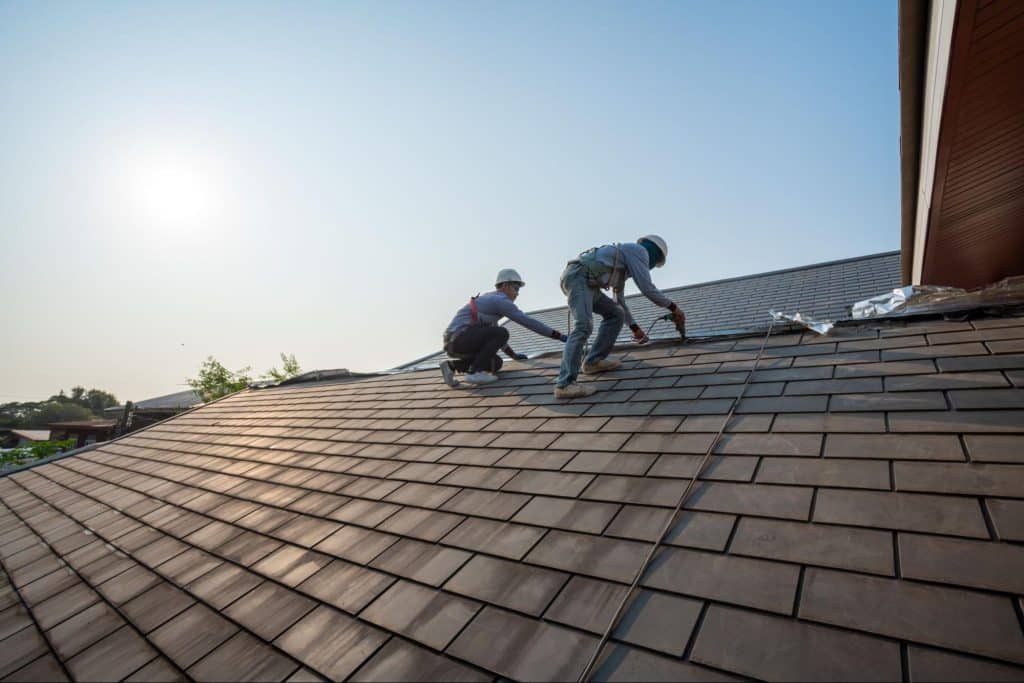Residential vs. Commercial Roofing: Key Differences Explained
Understanding Residential vs. Commercial Roofing
Residential and commercial roofing may share the same goal—protecting your property—but they differ in materials, structure, installation, and maintenance. Choosing the right roofing type for your building requires understanding these differences, especially in Granbury, TX, where climate and architectural styles impact roofing choices. K&K Roofing brings over 20 years of expertise to help you navigate these options and ensure your roof meets your needs.

Structural Differences Between Residential and Commercial Roofing
The structural design of residential and commercial roofs differs due to building size and purpose:
- Residential Roofing: Most residential roofs are pitched or sloped, using materials like asphalt shingles, metal roofing, or tile. The steep slope promotes drainage and adds to curb appeal.
- Commercial Roofing: Commercial roofs are often flat or low-slope to accommodate large HVAC systems or solar panels. Common materials include TPO, EPDM, and modified bitumen, which are durable and weather-resistant.
These differences in structure and materials impact both installation and maintenance, with commercial roofs often requiring additional reinforcement for durability.
Material Choices: Residential vs. Commercial
Selecting the right material is crucial for long-lasting performance and visual appeal. K&K Roofing offers a range of options to meet both residential and commercial needs:
- Residential Materials: Asphalt shingles are the most popular choice due to affordability and durability. Metal roofing is another long-lasting option, providing resistance to weather and lower maintenance.
- Commercial Materials: TPO and EPDM are common for flat commercial roofs, known for their flexibility, durability, and energy efficiency. These materials are also resistant to punctures, chemicals, and UV rays, making them ideal for large buildings.
Summary: In Granbury, TX, selecting the right materials based on your building type and local climate will improve your roof’s longevity and efficiency. K&K Roofing guides clients to the best options, ensuring each roof meets safety and aesthetic requirements.
Installation Process: Residential and Commercial
The installation process for residential and commercial roofs varies significantly due to differences in roof size, materials, and complexity:
- Residential Installation: Typically faster and less complex, residential roof installations focus on steeply pitched surfaces that drain water quickly. Asphalt shingles are straightforward to install, minimizing labor costs and time.
- Commercial Installation: Commercial roofing installations are more complex, often involving multiple layers and specialized materials for flat surfaces. Installation requires expert techniques to ensure durability against water pooling and heavy equipment.
These distinct installation needs mean that hiring a roofing contractor with experience in both residential and commercial projects—like K&K Roofing—ensures a roof that’s built to withstand the demands of its environment.
Maintenance and Durability Differences
Both residential and commercial roofs require regular maintenance, but the frequency and type of maintenance differ:
- Residential Roof Maintenance: Annual inspections to check for missing shingles, leaks, and flashing issues help extend roof life. Residential roofs, especially with asphalt shingles, may last 20-30 years with proper maintenance.
- Commercial Roof Maintenance: Flat roofs on commercial buildings need frequent inspections due to potential water pooling. Commercial roofs benefit from bi-annual maintenance, which checks for signs of punctures, membrane wear, and water drainage efficiency. TPO and EPDM roofs have a lifespan of 20-30 years, but regular maintenance can further extend their durability.
Summary: Consistent maintenance not only prevents costly repairs but also extends the life of your roof, making it a smart investment for property protection.
Energy Efficiency: Residential vs. Commercial Roofing
Energy efficiency is a key consideration in roofing, and the right material can significantly reduce energy costs:
- Residential Roofing Efficiency: Materials like metal roofing and reflective asphalt shingles help reduce energy costs by reflecting sunlight and minimizing heat absorption. This can lead to lower cooling costs in Granbury’s warm climate.
- Commercial Roofing Efficiency: TPO and other reflective materials on flat roofs enhance energy efficiency by reflecting UV rays and lowering interior temperatures. Roof coatings add an extra layer of insulation, further reducing energy costs for large commercial spaces.
Choosing the Right Roofing Contractor
When selecting a roofing contractor for your project, it’s essential to work with professionals who understand both residential and commercial needs. K&K Roofing has a deep understanding of the unique requirements for each roofing type in Granbury, TX, and offers personalized solutions to suit every property type.
Key Benefits of Choosing K&K Roofing:
- Experience and Expertise: With over 20 years of experience, K&K Roofing has a track record of delivering high-quality roofing solutions tailored to Granbury’s climate and architectural styles.
- Customer-Centric Approach: We prioritize customer satisfaction, offering clear communication, personalized advice, and transparent pricing.
- Certified and Insured: We are fully licensed, insured, and certified by top manufacturers, ensuring you receive a professional service backed by industry standards.
Frequently Asked Questions (FAQs)
- What is the average lifespan of a residential roof?
Most residential roofs last between 20-30 years, depending on materials and maintenance. - Which roofing material is best for commercial buildings?
TPO and EPDM are popular choices for commercial roofs due to their durability and energy efficiency. - Does K&K Roofing handle both residential and commercial projects?
Yes, K&K Roofing specializes in both residential and commercial roofing, with solutions tailored to each building type. - How often should I schedule roof inspections?
Residential roofs benefit from annual inspections, while commercial roofs should be inspected at least twice a year. - What are the signs my roof needs repair?
Look for leaks, damaged shingles, sagging, or excessive wear. These issues indicate it’s time to contact a professional for a thorough assessment.
At K&K Roofing, we’re dedicated to providing top-quality roofing solutions for both residential and commercial clients across Granbury, Fort Worth, and surrounding areas. Whether you need a roof repair, complete replacement, or regular maintenance, our expert team is here to help. Contact K&K Roofing today at (817) 579-6900 to discuss your roofing needs and schedule a consultation. Let us protect what matters most with roofing services you can trust.


